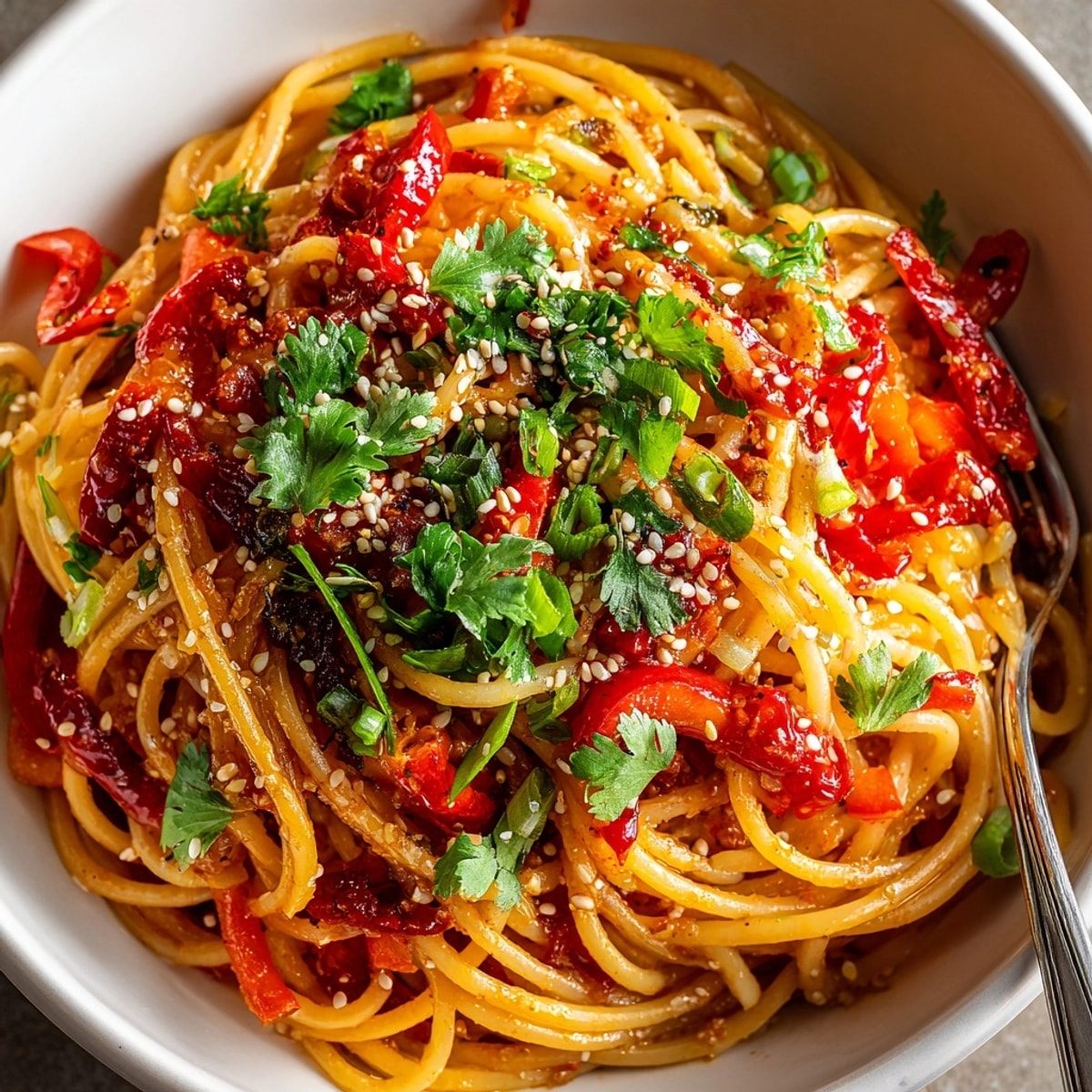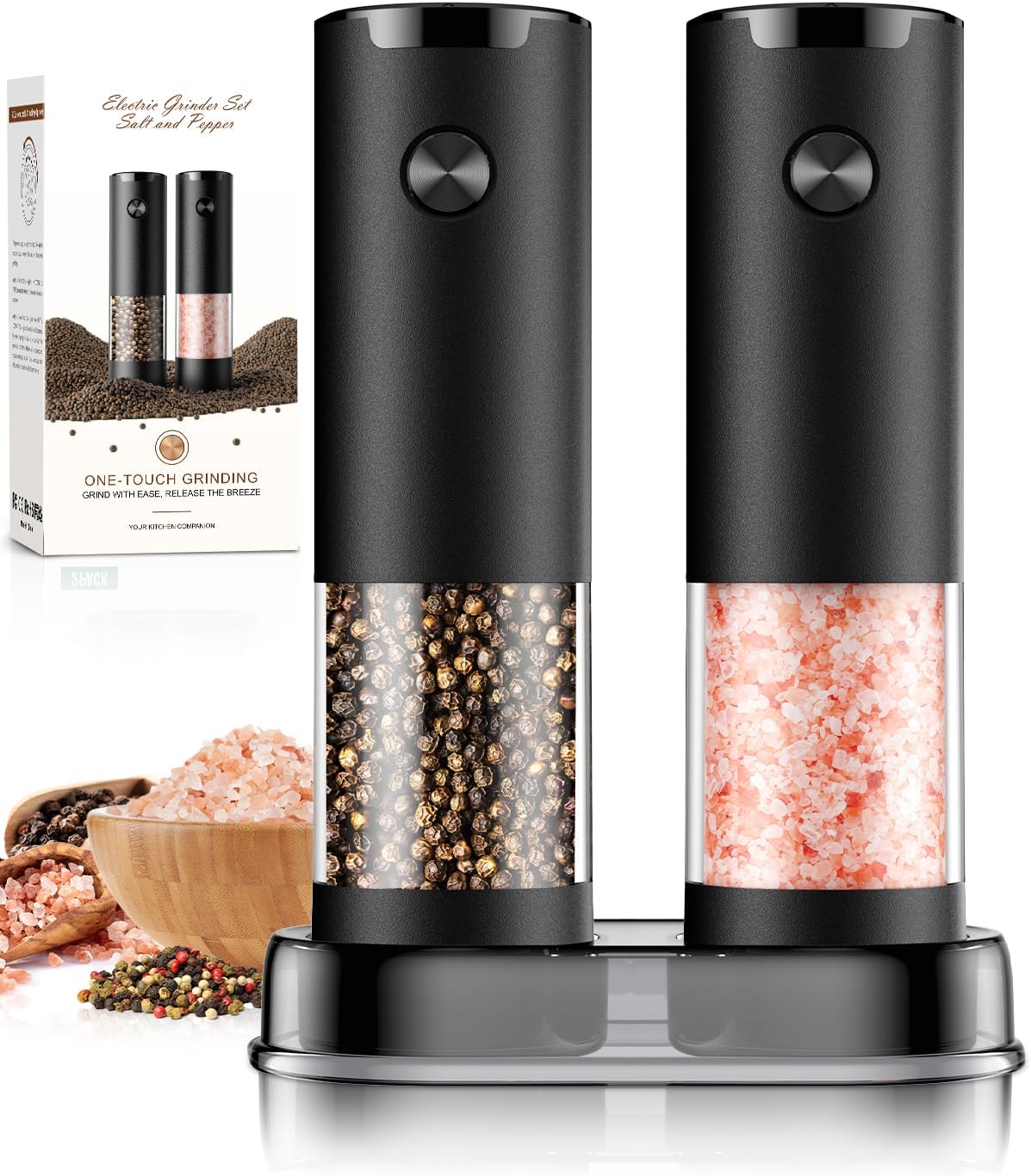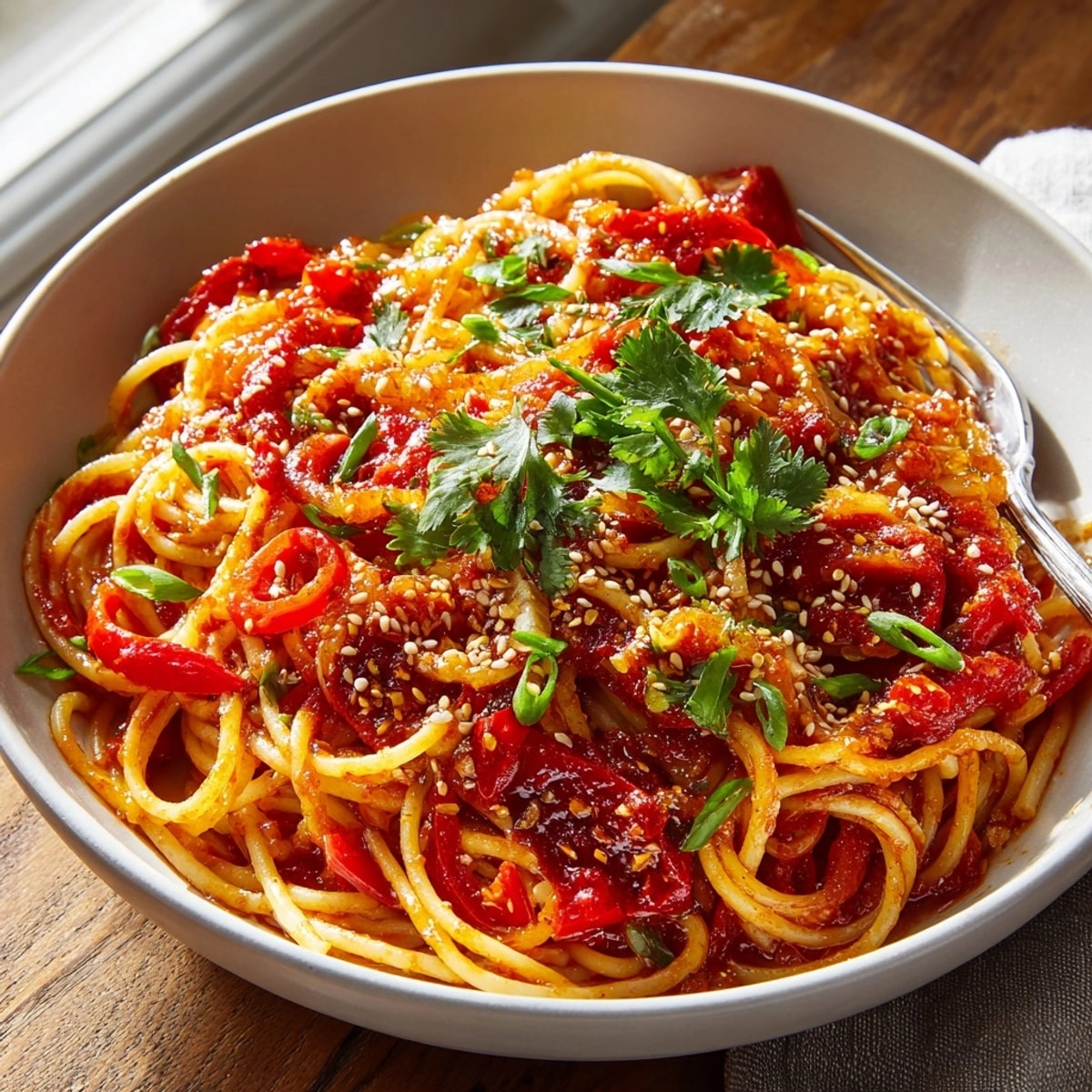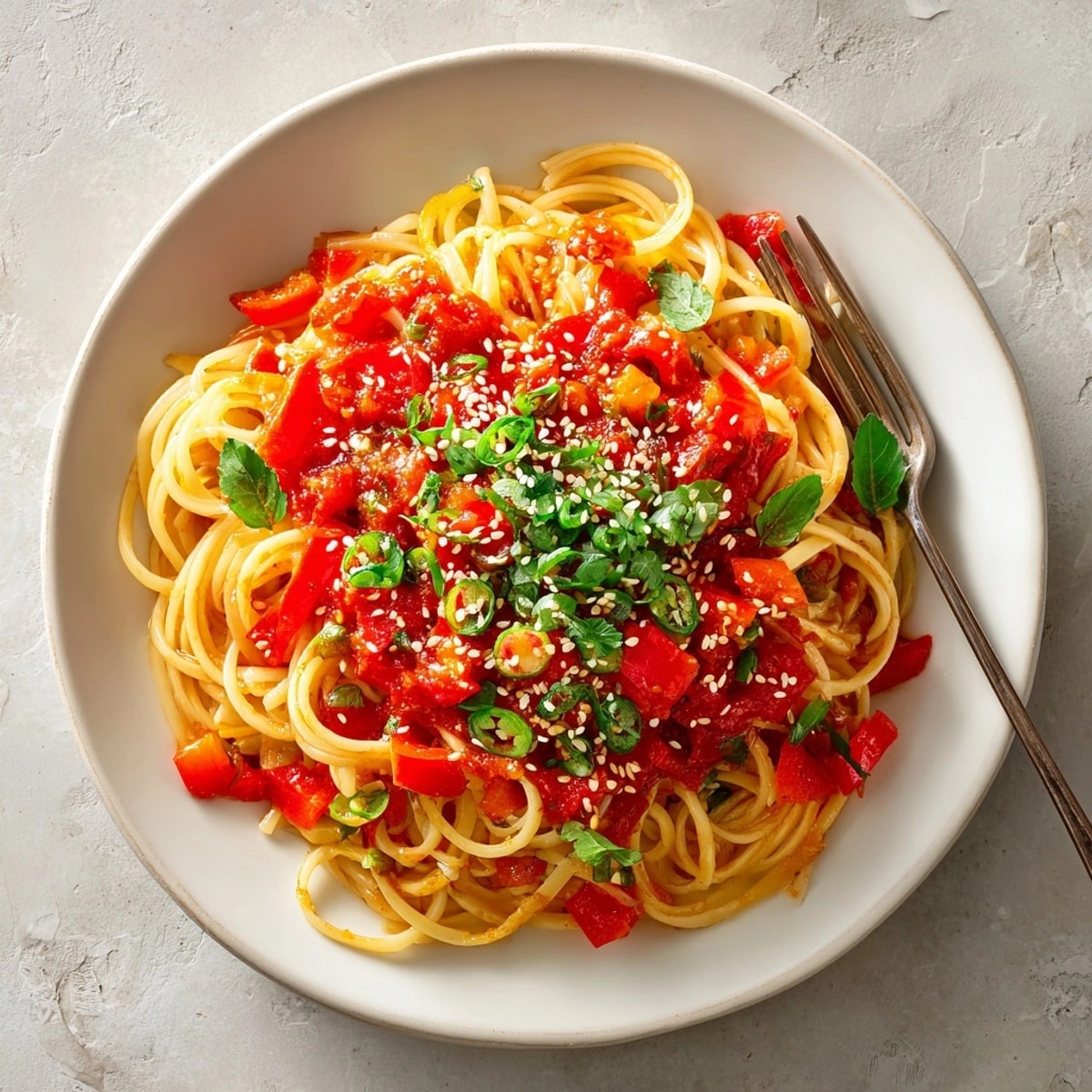 Save
Save This vibrant New Year Pasta with Lucky Red Sauce brings together the best of East and West cuisines in a celebration-worthy dish. The brilliant red sauce symbolizes good fortune and prosperity in New Year traditions, while delivering a delicious flavor profile that blends Italian pasta comfort with Asian-inspired seasonings.
I first created this fusion dish when hosting friends from different cultural backgrounds for New Year. The empty plates and requests for seconds convinced me this pasta deserved a permanent spot in my celebration repertoire.
Ingredients
- dried linguine or spaghetti: 350 g The long noodles symbolize longevity in Asian traditions. Choose bronze-die pasta for better sauce adherence.
- vegetable oil: 2 tbsp A neutral oil with high smoke point provides the perfect base for sautéing. Look for cold-pressed versions for cleaner flavor.
- small onion: 1 finely chopped Creates the aromatic foundation for the sauce. Sweet varieties like Vidalia add subtle sweetness.
- garlic cloves: 2 minced Fresh garlic provides essential depth. Select firm bulbs with no green sprouts for best flavor.
- fresh ginger: 1 tbsp grated Adds warming notes characteristic of Asian cuisine. Choose pieces with smooth skin and spicy fragrance.
- red chili: 1 deseeded and finely sliced Brings gentle heat that awakens the palate. Adjust quantity based on your spice preference.
- red bell pepper: 1 large diced Adds vibrant color and sweet crunch. Look for firm peppers with glossy skin.
- crushed tomatoes: 1 can 400g The base for our lucky red sauce. San Marzano tomatoes offer exceptional flavor if available.
- tomato paste: 2 tbsp Intensifies tomato flavor and thickens the sauce. Double-concentrated paste provides best results.
- soy sauce: 1 tbsp Introduces savory umami notes. Use low-sodium if watching salt intake.
- rice vinegar: 1 tbsp Balances richness with subtle acidity. Unseasoned varieties work best for this recipe.
- sugar: 1 tsp Harmonizes all flavors and counters tomato acidity. Raw cane sugar adds complexity.
- sesame oil: 1 tsp Adds distinctive nutty aroma. A little goes a long way with this potent finishing oil.
- Spring onions sesame seeds and fresh herbs for garnish: These provide textural contrast and visual appeal. Always choose the freshest available.
Instructions

- Boil the Pasta:
- Fill a large pot with water and add a generous pinch of salt about 1 tablespoon. Bring to a rolling boil over high heat. Add pasta and cook according to package instructions until al dente typically 8 to 10 minutes. Before draining reserve 1/2 cup of starchy pasta water which will help bind the sauce later. Drain pasta in a colander but do not rinse as the starch helps sauce adhesion.
- Create Aromatic Base:
- Heat vegetable oil in a large skillet over medium heat until it shimmers slightly. Add finely chopped onion and sauté for 2 to 3 minutes stirring occasionally with a wooden spoon until they become translucent but not browned. This slow cooking releases natural sweetness without bitterness.
- Develop Flavor Foundation:
- Add minced garlic grated ginger and sliced red chili if using to the softened onions. Cook for exactly 1 minute stirring constantly to prevent burning. You should immediately smell the fragrant aromas releasing into the oil. This brief cooking time preserves their vibrant flavors while removing raw sharpness.
- Incorporate Vegetables:
- Add diced red bell pepper to the aromatic mixture and cook for 3 to 4 minutes stirring occasionally. The peppers should soften slightly while maintaining some texture and will contribute natural sweetness and lucky red color to the final dish. Look for them to become slightly glossy as they release their juices.
- Build the Lucky Red Sauce:
- Pour in crushed tomatoes and add tomato paste soy sauce rice vinegar sugar and water. Stir thoroughly to combine all ingredients ensuring the tomato paste dissolves completely. Allow the sauce to simmer uncovered for 10 to 12 minutes stirring occasionally to prevent sticking. The sauce should reduce slightly and develop a rich vibrant red color symbolic of good fortune.
- Finish the Sauce:
- Once the sauce has thickened to coat the back of a spoon drizzle in the sesame oil and stir to incorporate. This late addition preserves the oil's delicate flavor. Taste the sauce and adjust seasoning as needed perhaps adding a pinch more salt or sugar to balance flavors according to your preference.
- Combine Pasta and Sauce:
- Add the cooked pasta directly to the sauce in the skillet. Using tongs gently toss the pasta until every strand is thoroughly coated with the lucky red sauce. If the mixture seems too thick gradually add reserved pasta water a tablespoon at a time until you reach your desired consistency. The starch in this water helps create a silky texture.
- Plate and Garnish:
- Divide the pasta among four warmed plates creating a small mound in the center of each. Sprinkle generously with sliced spring onions toasted sesame seeds and torn cilantro or basil leaves. For those who enjoy extra heat add a final drizzle of chili oil. Serve immediately while hot.

 Save
Save The ginger in this recipe is my secret weapon. I discovered its transformative power years ago when my grandmother added it to a traditional tomato sauce. That subtle warmth completely elevates the dish beyond ordinary pasta, creating something truly memorable that bridges culinary traditions.
Cultural Significance
The New Year celebration emphasizes foods that bring luck, prosperity, and happiness for the coming year. Red is considered the luckiest color in many Asian cultures, symbolizing joy and good fortune. This pasta dish honors that tradition while creating a delicious fusion experience. Long noodles specifically represent longevity and uncut destiny, which is why we use linguine or spaghetti rather than shorter pasta shapes. In many households, noodles are served uncut to preserve their length as a symbol of long life.
Make It Ahead
This lucky red sauce actually improves with time as flavors meld together. You can prepare the sauce up to three days in advance and store it in an airtight container in the refrigerator. When ready to serve, gently reheat the sauce in a skillet, adding a splash of water if it has thickened too much. Cook fresh pasta just before serving for best texture. This make-ahead option is particularly valuable during busy holiday preparations when time is precious.
Protein Additions
While delicious as a vegetarian dish, this versatile pasta welcomes protein additions that can further enhance its festive appeal. For seafood lovers, quickly sauté eight ounces of peeled shrimp or scallops and add them to the sauce in the final minutes of cooking. Vegetarians might enjoy eight ounces of firm tofu cut into cubes and lightly fried until golden before adding to the sauce. For a heartier meat option, brown half a pound of ground pork with five spice powder before starting the sauce, then proceed with the recipe as written.
Serving Suggestions

Present this vibrant dish family-style in a large shallow serving bowl garnished abundantly with herbs and sesame seeds. Serve alongside simple steamed vegetables like bok choy or broccoli dressed with a light drizzle of sesame oil and soy sauce. For a complete New Year experience, begin the meal with dumplings symbolizing wealth and follow the pasta with oranges or tangerines for good luck. Jasmine tea makes a perfect beverage pairing, or for celebrations, a crisp Pinot Grigio or plum wine complements the flavors beautifully.
 Save
Save Seasonal Adaptations
This recipe welcomes seasonal adjustments throughout the year while maintaining its lucky essence. Summer version can incorporate fresh cherry tomatoes instead of canned for brighter flavor. Winter adaptation might include heartier vegetables like finely diced carrots or sweet potato. Early spring ingredients like snow peas add delightful crunch and vibrant color.
This vibrant pasta dish is a beautiful way to celebrate new beginnings year-round. It offers a comforting yet exciting flavor profile that appeals to everyone at the table.
Recipe FAQ
- → Can I use a different type of pasta?
Yes, you can use any long pasta like fettuccine or even short pasta shapes. Adjust cooking time accordingly for best texture.
- → Is the sauce spicy?
The sauce has mild heat from chili, but you can omit or add extra chili oil for your desired spice level.
- → How can I make this vegan?
Simply choose egg-free pasta. The sauce itself is naturally vegan, so no other changes are necessary.
- → What proteins can I add?
Try sautéed mushrooms, tofu, or shrimp for additional protein while maintaining great texture and flavor.
- → What’s the best garnish for this dish?
Top with sliced spring onions, toasted sesame seeds, cilantro or basil, and a drizzle of chili oil for extra color and taste.